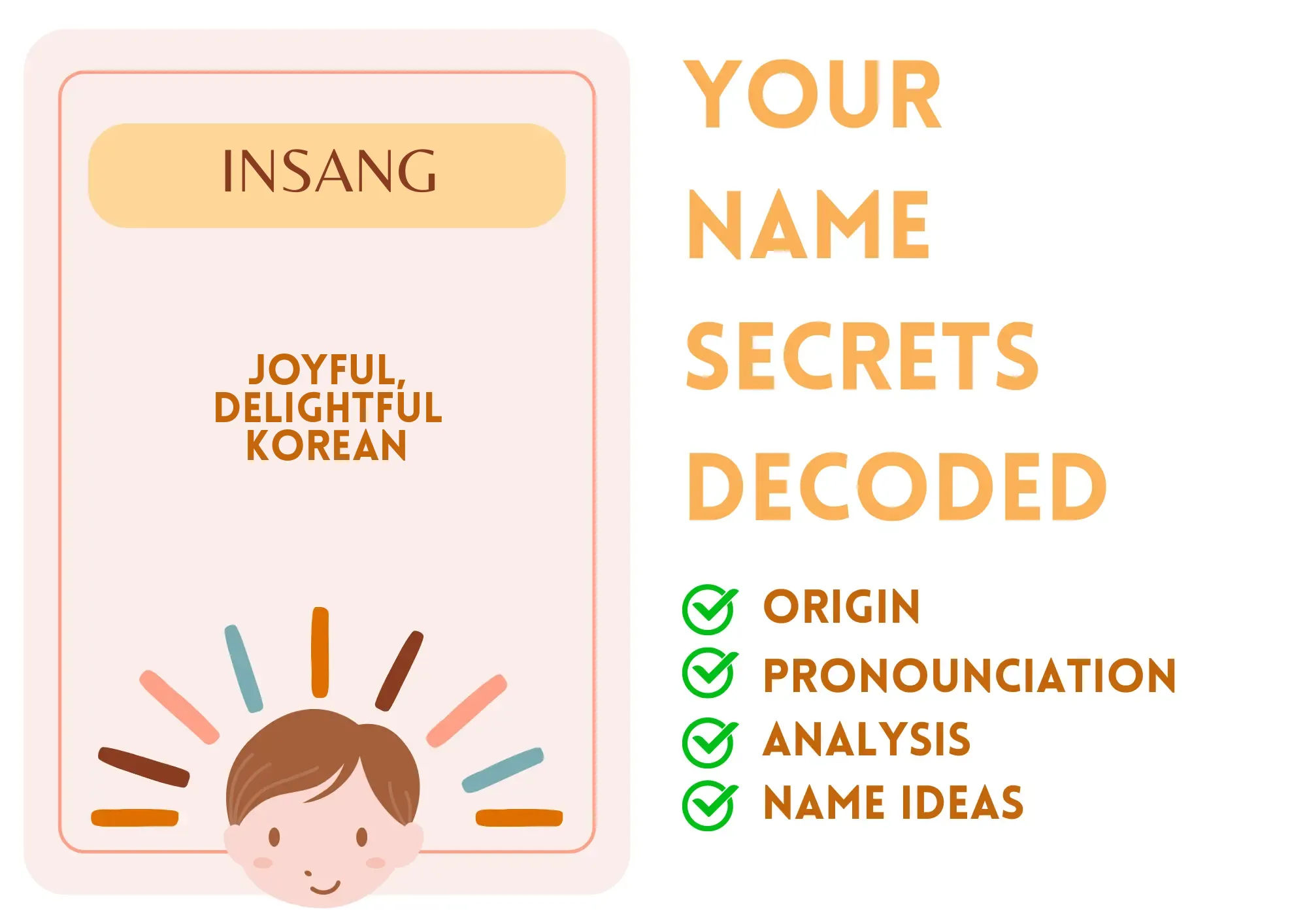
Insang
Insang is a unique name of Korean origin, translating to 'joyful' or 'delightful.' It is typically used as a masculine name in Korea but can also be found among females, particularly in more modern naming practices. Its roots in the Korean language symbolize joyfulness and positivity, making it a cherished choice for parents wishing to impart happiness to their child.
Insang carries a positive aura, often associated with cheerful disposition and bright future. As a name, it is relatively easy to pronounce and write, though it might be a bit unfamiliar to non-Korean speakers.
The name Insang is not frequently found in popular culture but has been noted in some Korean dramas and literary works, often embodying characters who bring joy or happiness to others. People given the name Insang are generally perceived positively, embodying the traits of joy and lightheartedness.
Basic Information
Gender: Boy
Sounds Like: in-sahng
Pronunciation Explanation: The first syllable is pronounced like 'in', followed by 'sahng' with a soft 'ng' sound.
Summary and Meaning
Meaning: joyful, delightful (Korean)
Origin: The name Insang has South Korean origins rooted deeply in Korean culture and language.
Usage: Insang is traditionally a masculine name in Korean culture but can be used for females, especially in modern contexts.
Name Number (Chaldean)
Name Number (Pythagorean)
Popularity (Global Rank)
Overall: 246949
Boys: 72681
Most Popular in
Religious and Cultural Significance
Religion: Buddhism
Background: While not directly linked to one religion, in Korea, many names bear cultural significance tied to Buddhist beliefs emphasizing joy and living life with a positive mind.
Cultural Significance: Insang is appreciated in Korean culture for its potential to represent a joyful life, making it a favored name among parents wanting to convey positivity and happiness.
Historical Significance: As a name, Insang may not have documented historical significance but reflects cultural and familial hopes for happiness, which has historical roots in Korean values.
Popular Culture
Literature and Mythology: Insang may appear in Korean literature, often describing characters known for their joyful and uplifting nature.
Movies and Television: Characters named Insang have appeared in various Korean dramas where they often represent joy or bring happiness to others.
Feelings and Perceptions
Perception: People often perceive the name Insang as uplifting and cheerful. It evokes feelings of happiness and positivity.
Positive Feelings: Joyful, uplifting, cheerful, positive, lighthearted.
Negative Feelings: May be seen as unusual or unfamiliar by those outside Korea.
Practical Considerations
Ease of Writing and Calling: Insang is moderately easy to write and pronounce, consisting of six letters and two syllables, though it may pose pronunciation challenges to non-Korean speakers.
Common Typos and Misspellings: Insangh,Insangh,In-sang,Insan
Common Nicknames: In,San,Sang
Insang Popularity
Insang Usage and Popularity By Country
| Country | Rank (Overall) |
|---|---|
| South Korea | 2906 |
| Nepal | 13473 |
| Japan | 16713 |
| Belgium | 48129 |
| Malaysia | 55545 |
| Canada | 74425 |
| United States | 116528 |
Insang Usage and Popularity By City
| City | Rank (Overall) |
|---|---|
| New York | 39655 |
| Seattle | 17340 |
Compatibility Analysis
Famous Persons Named Insang
No results found for Insang.
Related Names
Similar Sounding Names:
Insa,Sang,Inseong,Inha
Similar Meaning and Related Names:
Sibling Name Ideas (Brothers):
Kyungsoo ♂️
None specific